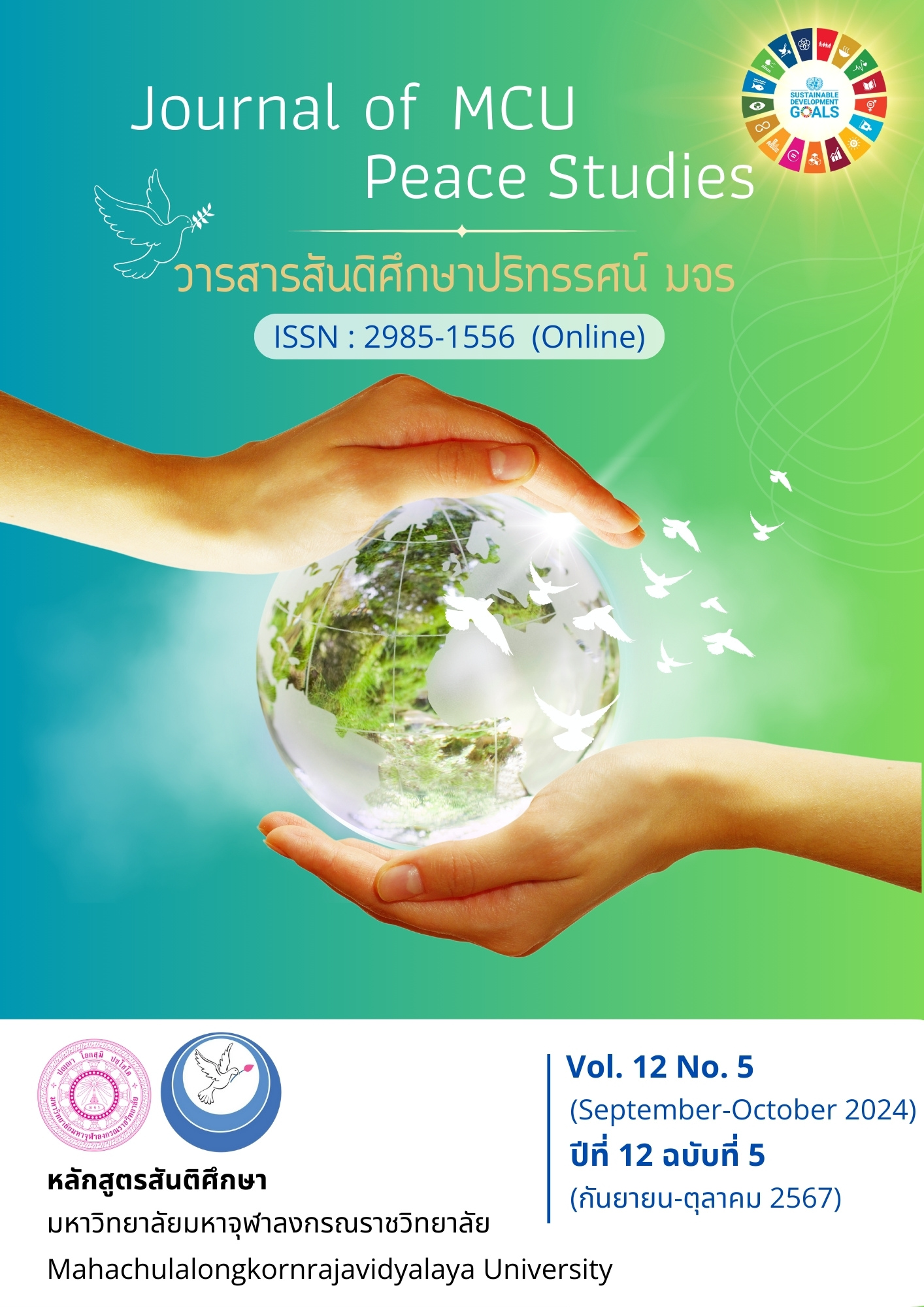การพัฒนาระบบการเรียนรู้แบบผสมผสานเพื่อเสริมสร้างพลังสุขภาพจิต สำหรับนักเรียนระดับชั้นมัธยมศึกษาตอนปลาย
Main Article Content
บทคัดย่อ
การวิจัยนี้มีวัตถุประสงค์เพื่อ 1) พัฒนาระบบการเรียนรู้แบบผสมผสานเพื่อเสริมสร้างพลังสุขภาพจิตสำหรับนักเรียนระดับชั้นมัธยมศึกษาตอนปลาย 2) ศึกษาเปรียบเทียบพลังสุขภาพจิตระหว่างก่อนและหลัง ของผู้เรียน และ 3) เพื่อประเมินความพึงพอใจระบบการเรียนรู้แบบผสมผสานเพื่อเสริมสร้างพลังสุขภาพจิตสำหรับนักเรียนระดับชั้นมัธยมศึกษาตอนปลาย กลุ่มตัวอย่างของงานวิจัยนี้ เป็นนักเรียนระดับชั้นมัธยมศึกษาตอนปลายของโรงเรียนเอกชนขนาดใหญ่ในจังหวัดสมุทรปราการ เลือกกลุ่มตัวอย่างเป็นการสุ่มอย่างง่าย (Simple Random Sampling) จำนวน 35 คน สำหรับเครื่องมือที่ใช้ในการวิจัย ได้แก่ 1) ระบบการเรียนรู้แบบผสมผสาน 2) แบบประเมินพลังสุขภาพจิต 3) แบบประเมินความพึงพอใจ และ 4) แบบสัมภาษณ์กึ่งโครงสร้าง เป็นการศึกษาเนื้อหาความรู้เกี่ยวกับพลังสุขภาพจิตด้วยระบบออนไลน์และการทำกิจกรรมกลุ่มในสถานศึกษา โดยนักเรียนจะได้ทำแบบประเมินพลังสุขภาพจิต Resilience Scale (RS-48, 13-18 years) ของกรมสุขภาพจิต ทั้งก่อนและหลังเข้าร่วมโครงการวิจัย การวิเคราะห์ข้อมูล ได้แก่ การหาค่าเฉลี่ย () ค่าเบี่ยงเบนมาตรฐาน (S.D.) และค่า t-test แบบ paired-sample t test
ผลการวิจัยพบว่า 1) ระบบการเรียนรู้แบบผสมผสานเพื่อเสริมสร้างพลังสุขภาพจิตที่พัฒนาขึ้นนั้น ทำให้จำนวนนักเรียนในกลุ่มพลังสุขภาพจิตต่ำและปานกลางลดลง แต่กลุ่มพลังสุขภาพจิตสูงมีจำนวนเพิ่มขึ้น เมื่อนักเรียนได้ทำแบบประเมินพลังสุขภาพจิตอีกครั้งหลังผ่านการเข้าร่วมโครงการวิจัย 2) การเรียนรู้แบบผสมผสานด้วยระบบออนไลน์และแบบเผชิญหน้า เพื่อเสริมสร้างพลังสุขภาพจิต ทำให้ระดับพลังสุขภาพจิตของนักเรียนดีกว่าก่อนการเข้าร่วมอย่างมีนัยสำคัญทางสถิติที่ระดับ 0.05 และ 3) นักเรียนที่เข้าร่วมโครงการวิจัย ประเมินความพึงพอใจระบบการเรียนรู้แบบผสมผสานเพื่อเสริมสร้างพลังสุขภาพจิตให้กับปัจจัยด้านกระบวนการสูงเป็นลำดับแรก โดยมีด้านปัจจัยนำเข้าเป็นลำดับที่สอง และปัจจัยด้านผลผลิตเป็นลำดับที่สามตามลำดับ
Article Details

อนุญาตภายใต้เงื่อนไข Creative Commons Attribution-NonCommercial-NoDerivatives 4.0 International License.
ทัศนะและความคิดเห็นที่ปรากฏในบทความในวารสาร ถือเป็นความรับผิดชอบของผู้เขียนบทความนั้น และไม่ถือเป็นทัศนะและความรับผิดชอบของกองบรรณาธิการ ยินยอมว่าบทความเป็นลิขสิทธิ์ของวารสาร
เอกสารอ้างอิง
Boonsathirakul, J. (2021). Crisis and Stress Coping of Senior High School Student. Srinakharinwirot Academic Journal of Education, 22(2), 204-219.
Cascio, J. (2020). BANI and Chaos. Retrieved Jebruary 7, 2024, from https://ageofbani.com/2022/04/bani-and-chaos/
Corey, G. (2016). Theory and Practice of Counseling and Psychotherapy. (9th ed.). California: Cengage Learning.
Fletcher, D., & Sarkar, M. (2013). Psychological Resilience: A Review and Critique of Definitions, Concepts, and Theory. European Psychologist, 18(1), 12-23.
Grotberg, E. H. (1995). A Guide to Promoting Resilence in Children: Strengthening the Human Spirit Vol. 8. The Hague. Netherland: Bernard van Leer Foundation.
Joyce, S. et al. (2018). Road to Resilience: A Systematic Review and Meta-Analysis of Resilience Training Programmes and Interventions. BMJ Open, 8(6), 1-9.
Kardkarnklai, U. (2015). Hybrid Learning Design and Effective Components of E-Learning in English Writing Course. Silpakorn University E-Journal, 35(1), 1-31.
Koolnaphadol, P. (2016). The Emotional Resilience Enhancement of Single Family Adolescent Students through Integrative Group Counseling Model. Journal of Education and Social Development, 12(2), 198-212.
Koolnaphadol, P., & Haenjohn, J. (2015). Education and Development of Resilience in the Elderly by Integrating the Process of Family Participation and Civil Society Networks. (Research Report). Chonburi: Burapha University.
Panchatree, S. (2008). Effect of the Resilience Enhacement Program on Stress of Students Preparing for University Adminssion Examination. (Master’s Thesis). Chiang Mai University. Chiang Mai.
Phophichit, N. (2017). Buddhist Psychological Factors Related to Resilience of Adolescents in Bangkok. Journal of MCU Peace Studies, 5(1), 253-263.
Rongpol, M. (2020). The Enhancement of Emotional Resilience of Undergraduate Students Whose Families Were Affected by the Unrest Situtation in the Southern Border Provinces through Integrative Counseling Model. (Doctoral Dissertation). Burapha University. Chonburi.
Roopkhai, N. (2014). Effects of Resilience and Academic Pressure on Academic Achievement of Secondary School Students with Academic Motivation as a Mediator. (Master’s Thesis). Chulalongkorn University. Bangkok.
Ruetathip, N., & Rujirachakon, S. (2022). Study of the Outcome of Mental Strength Development Program in Adolescents by the Resilient Development Program for Teenagers. Journal of Sakon Nakhon Hospital, 25(2), 54-62.
Rungreangkulkij, S., & Kotnara, I. (2009). Resilience: A Review Literature. Journal of Nursing Science and Health, 32(1), 90-101.
Suwanmaitri, S. (2009). Counseling Manual for Strengthening Resilience. Department of Mental Health, Ministry of Public Health. Bangkok: Beyond Publishing Co., Ltd.
Topping, K. J., Douglas, W., Robertson, D., & Ferguson, N. (2022). Effectiveness of Online and Blended Learning from Schools: A Systematic Review. Review of Education, 10(2), 1-41.
Ungar, M. (2018). What Works: A Manual for Designing Programs that Build Resilience. Retrieved February 17, 2024, from https://resilienceresearch/whatworks
World Economic Forum. (2020). The Future of Jobs Report 2020. Geneva: World Economic Forum.
Wright, A. C., Dyjur, P., Norman, D., & Kelly, P. (2022). Guide Principles of Blended and Online Course Design. Taylor Institute for Teaching and Learning. Calgary: University of Calgary.
Yu, Z., Xu, W., & Sukjairungwattana, P. (2022). Meta-Analyses of Differences in Blended and Traditional Learning Outcomes and Students' Attitudes. Frontiers in Psychology, 13, 1-14.


